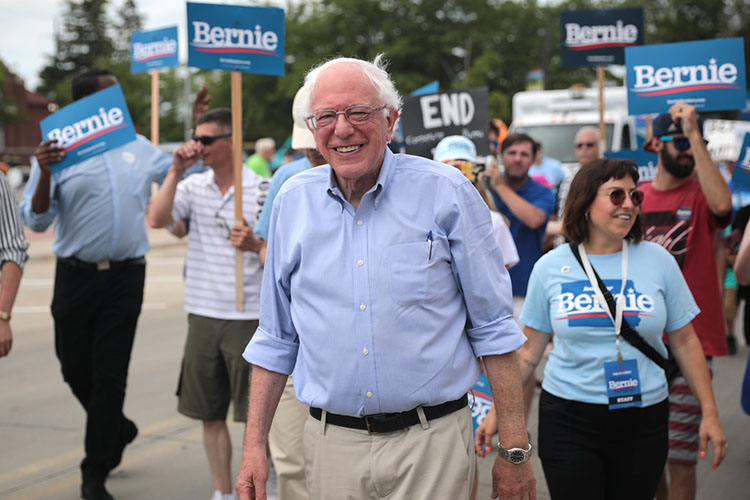Surging Sanders leads in California primary, says Berkeley IGS Poll

Five weeks before the California Democratic primary election, U.S. Sen. Bernie Sanders has emerged as the clear front-runner in the race, according to a new poll by the UC Berkeley Institute of Governmental Studies.
Sanders has built momentum among the state’s most liberal wing, with support now at 26% among likely voters in the March 3 primary, the poll found. U.S. Sen. Elizabeth Warren has continued to slide, with her support falling to 20%. Former Vice President Joe Biden, representing the party’s moderates, is at 15%, effectively unchanged since the last Berkeley IGS Poll in November.
Support from younger voters and Latinx voters is crucial to Sanders’ advance, said IGS Poll Director Mark DiCamillo. But while voter opinion seems to be solidifying, he said, the dynamics that drive voter turnout could determine the outcome.
“If younger voters turn out in a big way, it could propel Sanders,” DiCamillo said. “If older voters turn out in greater proportions, that could benefit Biden…. In this particular election, voter turnout will be really, really critical.”
The poll, conducted from January 15-21, reflects sustained momentum for Sanders among likely voters in California’s Democratic presidential primary. In June 2019, he was the top choice of 17% of likely Democratic voters, placing him third among the contenders. In that span, Biden and Warren each has held the lead and then lost it, but Sanders has made modest, steady advances across four polls.
While Biden continues to lead in nationwide opinion surveys, Sanders’ California numbers appear to match a trend seen in other parts of the country.
In both Iowa and New Hampshire, which open the nomination process early next month, Sanders has recorded significant gains in recent weeks as Warren has lost the momentum she built in the summer and fall of 2019.
Sanders’ support among younger California Democratic voters is “striking,” the poll found.
“He currently receives the backing of 54% of voters under age 30 and 39% of voters age 30-39,” DiCamillo wrote in his analysis of the results.
Latinx voters also are contributing to Sanders’ surge, with 38% naming him as their top choice. They are expected to comprise about a quarter of the Democratic electorate on March 3, the poll reports.
Among moderate Democrats, support for Pete Buttigieg, the former mayor of South Bend, Ind., has waned from 12% in November to 7% this month. But Biden has not benefited from Buttigieg’s losses, nor from the December decision by U.S. Sen. Kamala Harris of California to drop out of the race.
The new IGS poll shows Biden up only one percentage point from the 14% he registered in November. Moderate voters instead are gravitating to other candidates. Former New York City Mayor Michael Bloomberg, who has spent $30 million on California advertising, rose from 2% in November to 6% in the latest poll. U.S. Sen. Amy Klobuchar of Minnesota and tech entrepreneur Andrew Yang both have increased support since September, though they remain in single digits.
The number of undecided Democrats has risen from 8% in September to 12% this month.
But in those numbers is a dramatic risk for Biden: Under California’s complex new delegate-apportionment rules, a candidate must win 15% of the vote statewide in order to win statewide delegates for the nominating convention in July. “Any further expansion in Bloomberg’s support could jeopardize Biden’s ability to remain at the 15% threshold,” the poll says.
Who is most electable in November?
The new IGS poll shows a continuing paradox among the Democratic voters: While Sanders leads the field, a plurality of voters – 32% – say Biden is the candidate most capable of defeating Republican President Donald Trump. Sanders is viewed as the stronger competitor by 26%.
Underlying those opinions are deep differences in the priorities that guide voters’ decisions.
Overall, 53% say it’s more important to choose a candidate with the best chance of winning in November; 47% base their choice on who most agrees with them on the issues.
Among voters who back Biden, Klobuchar or Bloomberg, large majorities say their priority is defeating Trump; they tend to be older and more highly educated. Among Sanders’ supporters, only 35% say that their top priority is choosing a candidate who can defeat Trump. Warren supporters are evenly divided on that issue.
Opinions on electability appear directly related to age: Among voters 65 and older, 72% are basing their choice on who can win in November. Among voters 18 to 29, fully 80% said their preference is based on who agrees with them on the issues.
The poll was administered online in English and Spanish from January 15 through 21 among 6,845 registered voters statewide, 2,895 of whom were considered likely voters in the state’s Democratic primary.
